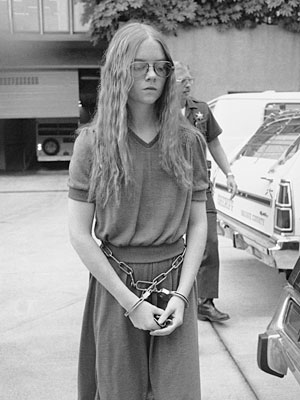“Ugh, it’s Monday” are the words that usually follow the arrival of the most dreaded day of the week. The sighs floating in the air are palpable and nothing seems possible. Mondays always carry with them a negative connotation and contain components such as depression, fatigue, and anguish. But to a San Diego elementary school, and to a troubled sixteen year old, Monday, January 29, 1979 held an even more distressing meaning.

Students at Grover Cleveland Elementary School, located in San Diego, California, began what they believed would be a normal Monday morning like any other, with bells ringing and students racing to their classes. Little did they know, however, that across the street, sixteen-year-old Brenda Ann Spencer was aiming her .22 caliber semiautomatic rifle right at society’s ultimate refuge, the elementary school, and its surroundings. After the first bell rang, Brenda broke the panels on the front door of her home, which was located right across the street from the elementary school. And she began to fire. The school’s principal, Burton Wragg, while rushing outside, was hit on the shoulder and chest with Spencer’s bullets and eventually died. Michael Suchar, the school’s custodian, ran outside with a blanket in order to cover Wragg and keep him from going into shock, but he quickly became the second victim of Spencer’s shooting and lost his life. In between all the chaos, 28 year old Robert Robb, a recent graduate of the police academy, while examining Wragg’s and Suchar’s bodies, was shot under his right shoulder blade.1 He would go on to survive though, along with the eight other children who were wounded in the incident. At least three of those children had abdominal wounds. A nine-year-old student, Cam Miller, was struck in the back with a bullet that exited through his chest without hitting any internal organs. Another, Christy Buell, was shot through her abdomen and in the buttocks, and had to undergo surgery in order to repair her intestine.2
When Gus Stevens, a reporter for the San Diego Evening Tribune, began calling around the area to gain more information about the shooting, he coincidentally placed a call to Spencer’s home where she gave him exactly what he wanted. She described the shooter, a sixteen year old, and the shooter’s address. When Stevens realized that she gave him her own address, he recognized what was going on and requested an interview while another staff member informed the police of the situation. The police, now aware of where the shots were coming from, were able evacuate the children and obstruct Spencer’s line of sight while trying to negotiate with her. After several hours, Brenda Spencer surrendered her weapon and several rounds of ammunition, and was subsequently arrested. While on the phone with Stevens, Spencer had stated that she was just shooting for the “fun of it.” She went on to say that she just didn’t like Mondays and did this “because it’s a way to cheer up the day.”3

Contrary to her initial claim, she later went on to state in her 2001 parole hearing that she had been “sexually abused by [her] father” and was “waiting for the cops to show up so they could shoot [her].”4 This new information has fueled many more theories today about Brenda Spencer’s true motives in committing such a crime. During her pretrial psychological testing, an injury to Spencer’s temporal lobe came to light. Spencer has also stated in a letter from prison that she experiences “grand mal seizures” that she has to counteract with medications.5 Such a brain injury would definitely be a precursor to epilepsy, which is two to four times more common among violent offenders than the public.6 The lack of treatment she received for this disease, to some, proves the neglect that she experienced from her family and in her childhood. Psychologist Jonathan Fast introduces the idea that her brain injury, abuse, and the effects of it pushed her to her final actions. He believes that the shame, ridicule, inferiority, and powerlessness that she felt encouraged her to go as far as she did. In another letter she wrote in prison, she stated that her “father had done everything a person could do to another person. The beatings, the touching, the emotional abuse.” She went on to state that no one, not teachers or counselors, gave her assistance through this, so she simply thought that this was how the world and how life worked. When her father gifted her the .22 caliber rifle, she thought that he was finally telling her to do it: to take her life successfully, unlike her past suicide attempts, and leave the world forever.7
Whether these theories are true or not, Brenda Spencer was tried as an adult and pleaded guilty to two counts of murder and nine counts of assault. She was sentenced to twenty-five years to life in prison, and is still serving her sentence at the California Institute for Women. The shooting has inspired a song by the Boomtown Rats called “I Don’t Like Mondays,” and has also gained other media coverage through a documentary.8 Her action went down in history as the first high profile school shooting and has become a vanguard to many future, unimaginable school situations and violent outbreaks. Whether Spencer was a cold-hearted killer or a truly lost and confused soul that simply wanted an escape, it is undeniable that her horrible actions have had some frightening consequences in our modern world.
- Jonathan Fast, Ceremonial Violence (New York: The Overlook Press, 2008), 25, 70-71. ↵
- Tamara Jones, “Look Back in Sorrow,” Good Housekeeping 227, no.5 (November 1998): 118. ↵
- Jonathan Fast, “Unforgiven and Alone: Brenda Spencer and Secret Shame,” in School Shootings: International Research, Case Studies, And Concepts For Prevention, ed. Nils Böckler (New York: Springer, 2013), 253-255. ↵
- Debra Sevey, “Subsequent Parole Consideration Hearing of Brenda Spencer,” (Capitol Electronic Reporting, 2001), 15-16. ↵
- Jennifer Furio, Letters From Prison: Voices Of Women Murderers (New York: Algora Pub., 2001), 134. ↵
- Jonathan Fast, ” Unforgiven and Alone: Brenda Spencer and Secret Shame,” in School Shootings: International Research, Case Studies, And Concepts For Prevention, ed. Nils Böckler (New York: Springer, 2013), 251. ↵
- Jennifer Furio, Letters From Prison: Voices Of Women Murderers (New York: Algora Pub., 2001), 134-135. ↵
- Encyclopedia of School Crime and Violence, September 2011, s.v. “Brenda Spencer,” by Laura L. Finley. ↵



243 comments
Maxx Arizmendi
School shootings are very sad, and it’s even sadder that they have been occurring more in recent months this year. I’m glad I read this article because I never heard about this shooting, and it was interesting to read about it. Based on what I read, it seems that Brenda is a complete psychopath and she started the shooting for the sheer pleasure of it. Even though she was dealing with some issues at home, Brenda didn’t have the right to shoot up the school from her home. She massacred innocent ones.
Janelle Escobedo-Ovalle
It is a sad reality that school shootings have become more common now. Before reading this article I had never heard of this specific shooting nor had I heard of Brenda. The article states how Brenda was going through her personal issues at home, however that doesn’t justify her actions. Everyone goes through rough patches. She took innocent lives and caused trauma for survivors.
Madeline Torres
This article was overall well written and very thought out. It’s saddening how these things are still something to be worried about today. This article made it very easy to understand how much this affects the modern day. Although, there is no excuse for what she did and for the lives she took. It’s very sad how these children had to go through something so horrific and will always be affected from this event. No one really knows what is actually going through someones mind and what they are thinking.
Crystal Baeza
It’s devastating to read these articles and still see many in today’s world. School shooting are always alarming and upsetting to those harmed, affected, and around the area. Brenda may have explained she went through unfortunate events growing up but that doesn’t give her the rights to take away lives from others. It’s no one’s right to destroy families and rip apart many lives because they were pain. It’s a tragedy we still live with this issue but I only hope we can figure a solution for these problems and save many lives as possible.
Hailey Rodriguez
Wow. This article truly made my skin crawl. It is very sad that children who go through such terrible things at home feel the need to spread this pain to the rest of the world, specifically, their peers. Before reading this article I had only heard about this story in a brief context. I never knew all the details or even the age or the story of the shooter. I think her father is mainly to blame because A. he gave her reason to feel as though doing this was okay or, at least, an answer to her problems and B. he’s the one who gave her a gun in the first place. Honestly, what kind of father gives a gun to a damaged (by his own actions) 16-year-old girl? It is shocking to me that people can be so empty hearted.
Tyanne Pearcy
This article really caught my attention due to the year that this tragic event occurred. When you think of school shooting, the 21st century is the first thing that comes to mind. In this article Brenda Spencer a “troubled teen” shot up a school in 1979, stating that she did it cause she hates Mondays. Brenda’s responses for her actions, don’t help figure out the real problem as to why school shootings continue to occur today.
Megan Copeland
These stories are always so sad. Before reading this article, I had never heard of this school shooting. I have never understood why people can do such horrible things like this. I wish someone could have been there for Brenda Spencer while she was growing up to possibly help prevent this, but I feel like she got the punishment she deserved. No matter what you have gone through in life, you should never take it out on other people, especially in this way. This was a great article because it tied in all of the details of Brenda Spencer’s past and included it into the plot of the article.
Marina Castro
School shootings are events that always come unexpected to the public. A lot of questions arise, such as, why would someone commit such a crime? How did that person manage to commit such a crime? What is also very concerning is the fact that these are kids. A kid shouldn’t have that type of thought on their head. Brenda Spencer is most likely a victim of a society that incites violence.
Luis Magana
It is ironic how school shootings are becoming something much more common. The things that Brenda Spencer had stated that pushed her to commit that act are confusing. First she states that she did it for fun and because she hates Mondays, but later on she said that as a child she was neglected and abused by her father so as to why she felt the need to shoot at an elementary school is in my head. I’m questioning weather there was something else. Even if it sounds reasonable what the article said about the emotions she felt for example powerlessness.
Reagan Meuret
It is sad to see such a young girl take two lives and effect so many others. It is also sad to know that we will never truly know her motives. It may have been her insanity but it may also be her father, but it will sadly forever be a mystery. I just hope the one good thing from tragedy’s like these is that people will learn from them and understand that it should never be the option.